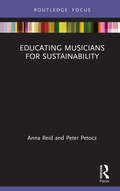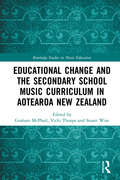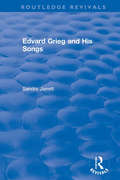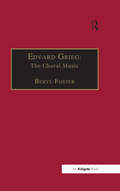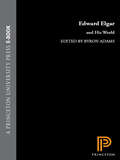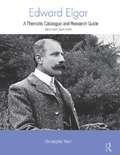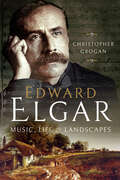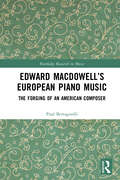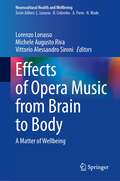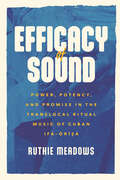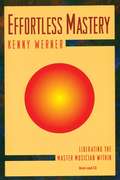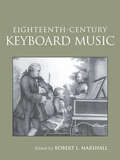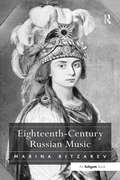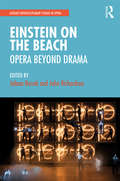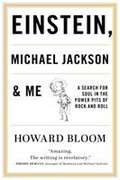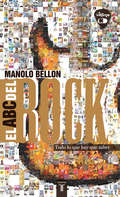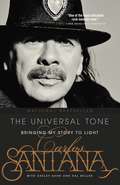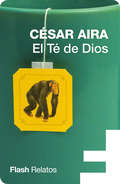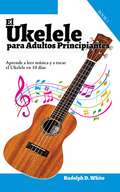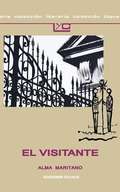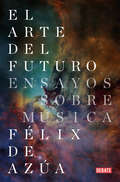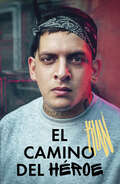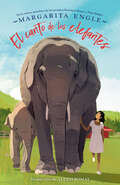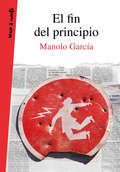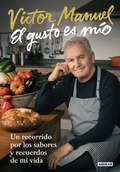- Table View
- List View
Educating Musicians for Sustainability (ISME Series in Music Education)
by Anna Reid Peter PetoczEducating Musicians for Sustainability explores the intersections of sustainability and music, investigating how sustainability affects the development and professional preparation of musicians while asking the question, ‘What does sustainability have to do with music?’ The volume presents a series of case studies organised according to an expanded view of the ‘four pillars of sustainability’, addressing cultural, environmental, economic, and social concerns. These case studies reveal a multitude of intersections, highlighting the crucial role music can play in raising awareness and overcoming the crisis of sustainability. In examining pedagogical and practical implications, aspiring musicians are encouraged to develop a broader view of the musical profession as a human endeavour, one that is intimately related to the world in which they live. Educating Musicians for Sustainability addresses the most pressing and serious problem of contemporary times – and seeks to inspire changes in attitudes and behaviour, for the benefit of all of humanity.
Educational Change and the Secondary School Music Curriculum in Aotearoa New Zealand (Routledge Studies in Music Education)
by Stuart Wise Graham McPhail Vicki ThorpeEducational Change and the Secondary School Music Curriculum in Aotearoa New Zealand provides a fascinating case study in educational change. The music curriculum has been greatly affected by deep cultural and economic forces such as the growth of popular music's importance in young people's lives, by demands for inclusive and multicultural education, and not least by advances in technology that promise to invigorate all aspects of teaching and learning. This book brings together the work of a number of leading music education scholars and teachers from Aotearoa/New Zealand to both explore these issues and to share case studies of practice: both the positive changes and the unintended consequences. Each chapter focuses on a current issue in music education and the final chapter contains responses from a number of practitioners to the issues raised by the authors, drawing together the practical and theoretical dimensions of the book.
Edvard Grieg and His Songs (Routledge Revivals)
by Sandra JarrettOriginally published in 2003, Edvard Grieg and his Songs examines the lifetime of Edvard Grieg. His songs were among his most popular and well-known works and both historians and critics have seen in them, Grieg at his most sophisticated and innovative. Important in and of themselves, the songs also illuminate critical aspects of his other works such as his musical impressionism, his use of folk music as a source of inspiration, and his novel approach towards harmony. Fifty of Grieg’s most important songs form the focus of this book. Each song is discussed individually and within the wider context of the composer’s output. The book provides a translation of the lyrics, and analysis of the poem and a description of the song’s form, melody, tessitura, harmony, rhythm and accompaniment, together with suggestions for interpretation. In addition to this, the book gives a brief biography of Grieg, with a chapter that analyses his approach to song writing.
Edvard Grieg: The Choral Music
by Beryl FosterEdvard Grieg‘s choral music has remained little known outside Scandinavia. One of the chief aims of this book is to bring this body of work to the notice of a wider audience, in the hope that it may receive greater prominence in concert programmes. Choral pieces form a relatively small proportion of Grieg‘s total output, although works such as the Album for Male Voices and the Four Psalms represent significant developments in his compositional career. In this study Beryl Foster not only provides an in-depth examination of this music, but also presents a picture of Norwegian musical life in the second half of the nineteenth century. An overview of Norway‘s choral tradition from the Middle Ages provides the historical context from which Grieg came to the genre. Subsequent chapters discuss in detail the types of choral works that he wrote, such as occasional and commemorative pieces, dramatic works and solo song arrangements. A set of useful appendices, including a chronological list of works and a discography complete this original survey.
Edward Elgar and His World
by Byron AdamsEdward Elgar (1857-1934) is undoubtedly one of the most fascinating, important, and influential figures in the history of British music. He rose from humble beginnings and achieved fame with music that to this day is beloved by audiences in England, and his work has secured an enduring legacy worldwide. Leading scholars examine the composer's life in Edward Elgar and His World, presenting a comprehensive portrait of both the man and the age in which he lived. Elgar's achievement is remarkably varied and wide-ranging, from immensely popular works like the famous Pomp and Circumstance March no. 1--a standard feature of American graduations--to sweeping masterpieces like his great oratorio The Dream of Gerontius. The contributors explore Elgar's Catholicism, which put him at odds with the prejudices of Protestant Britain; his glorification of British colonialism; his populist tendencies; his inner life as an inspired autodidact; the aristocratic London drawing rooms where his reputation was made; the class prejudice with which he contended throughout his career; and his anguished reaction to World War I. Published in conjunction with the 2007 Bard Music Festival and the 150th anniversary of Elgar's birth, this elegant and thought-provoking volume illuminates the greatness of this accomplished English composer and brings vividly to life the rich panorama of Victorian and Edwardian Britain. The contributors are Byron Adams, Leon Botstein, Rachel Cowgill, Sophie Fuller, Daniel M. Grimley, Nalini Ghuman Gwynne, Deborah Heckert, Charles Edward McGuire, Matthew Riley, Alison I. Shiel, and Aidan J. Thomson.
Edward Elgar: A Research and Information Guide (Routledge Music Bibliographies #Vol. 1017)
by Christopher KentThis updated second edition is an in-depth exploration of Elgar's compositions and of writings by and about the composer and his music. The past 16 years have seen a steady increase in scholarly publications and the emergence of The Elgar Society Journal, as well as further discoveries of the composer's MSS and letters, and the new edition incorporates this latest research. The compositions are examined in a work-by-work catalog, in chronological order, in which each entry gives a complete census and collation of manuscript, proof, text, biographical, printed edition and bibliographical sources for each item. The listing also includes unfinished sketches and details of much unpublished material. The bibliography section covers selected established literature as well as details of reviews and articles contained in the European periodicals at the climax of Elgar's career.
Edward Elgar: Music, Life and Landscapes
by Christopher GroganThe first full-length study of the English composer’s complex interaction with his physical environment, and its new relevance in the 21st century.More perhaps than any other composer, Edward Elgar (1857-1934) has gained the status of an “icon of locality,” his music seemingly inextricably linked to the English landscape in which he worked. This, the first full-length study of Elgar’s complex interaction with his physical environment, explores how it is that such associations are formed and whether it is in any sense true that Elgar alchemized landscape into music.It argues that Elgar stands at the apex of an English tradition, going back to Blake, in which creative artists in all media have identified and warned against the self-harm of environmental degradation and that, following a period in which these ideas were swept away by the swift but shallow tide of Modernism in the decades after the First World War, they have since resurfaced with a new relevance and urgency for twenty-first century society.Written with the non-specialist in mind, yet drawing on the rich resources of post-millennial scholarship on Elgar, as well as geographical studies of place, the book also includes many new insights relating to such aspects of Elgar’s output as his use of landscape typology in The Apostles, and his encounter with Modernism in the late chamber music. It also calls on the resources of contemporary social commentary, poetry and, especially, English landscape art to place Elgar and his thought in the broader cultural milieu of his time. A survey of recent recordings is included, in the hope that listeners, both familiar and unfamiliar with Elgar’s music, will feel inspired to embark on a voyage of (re)discovery of its endlessly rewarding treasures.
Edward MacDowell’s European Piano Music: The Forging of an American Composer (Routledge Research in Music)
by Paul BertagnolliEdward MacDowell’s European Piano Music is a critical study of the piano music that MacDowell composed during his European sojourn (1876–1888), steeped in reception history and with a special emphasis of programmaticism.The book expands current knowledge of MacDowell’s childhood in four of the chapters based on his previously uninvestigated sheet music collection, thereby achieving a better balance among the stages of MacDowell’s life than is evident in most books of the life-and-works variety. Prolific contemporaneous music criticism, meticulously preserved in MacDowell’s scrapbooks, is likewise undervalued in the MacDowell literature, but it furnishes penetrating observations about the expressive and programmatic content of numerous compositions, especially as it was revealed to critics when MacDowell performed his own works. Lastly, the book offers explanations for why MacDowell immersed himself in European culture for decades and then, at a crucial juncture in his career, embraced diverse American heritages and worked toward a conception of a pluralistic music that was American “in a creative sense.”The book’s content and methodology would appeal most directly to specialists within the broad fields of musicology and music theory, particularly within American art music and its composers; nineteenth-century music; program music; reception history; and piano literature.
Effects of Opera Music from Brain to Body: A Matter of Wellbeing (Neurocultural Health and Wellbeing)
by Lorenzo Lorusso Michele Augusto Riva Vittorio Alessandro SironiThis book explores the connection between melodrama and medicine from multiple perspectives. Neuroscientists study the relationship between opera and brain functioning in the light of new findings in the fields of neurophysiology, neuroimaging, cognitive science and neuro-musicology; clinicians investigate the therapeutic potential of music, especially in the field of treatment and rehabilitation of individuals with neurodegenerative diseases; medical historians analyse the representation of diseases and those who cure diseases within operas; occupational doctors report descriptions of diseases that affect workers in the opera world and particularly focus on psychiatric and psychological alterations. Opera, with its instrumental and vocal accompaniment, is considered the most complete form of theatrical performance. However, little is known about the mechanisms of brain activity under the influence of melodrama on singers, musicians, and listeners. The use of neuroimaging techniques has enabled a better understanding of the neuronal mechanisms and circuits involved during an opera performance. Over the past 20 years, melodrama has increasingly been used as a therapeutic approach in various neurological and neuropsychiatric pathologies, such as depression, cognitive impairment, and even coma. The book also discusses the ways in which melodrama affects professionals involved in music and interventions to reduce or alleviate occupational diseases, leading to improved health and higher life satisfaction. The ultimate goal is to improve therapeutic interventions in neurological diseases and professional disorders, relying on solid neuroscientific data. This book will be of great interest to neurologists, neurobiologists, psychiatrists, occupational doctors and therapists in music.
Efficacy of Sound: Power, Potency, and Promise in the Translocal Ritual Music of Cuban Ifá-Òrìsà (Chicago Studies in Ethnomusicology)
by Ruthie MeadowsThe first book-length ethnographic study on music and Ifá divination in Cuba and Nigeria. Hailing from Cuba, Nigeria, and various sites across Latin America and the Caribbean, Ifá missionary-practitioners are transforming the landscape of Ifá divination and deity (òrìṣà/oricha) worship through transatlantic travel and reconnection. In Cuba, where Ifá and Santería emerged as an interrelated, Yorùbá-inspired ritual complex, worshippers are driven to “African traditionalism” by its promise of efficacy: they find Yorùbá approaches more powerful, potent, and efficacious. In the first book-length study on music and Ifá, Ruthie Meadows draws on extensive, multisited fieldwork in Cuba and Yorùbáland, Nigeria, to examine the controversial “Nigerian-style” ritual movement in Cuban Ifá divination. Meadows uses feminist and queer of color theory along with critical studies of Africanity to excavate the relation between utility and affect within translocal ritual music circulations. Meadows traces how translocal Ifá priestesses (ìyánífá), female batá drummers (bataleras), and priests (babaláwo) harness Yorùbá-centric approaches to ritual music and sound to heighten efficacy, achieve desired ritual outcomes, and reshape the conditions of their lives. Within a contentious religious landscape marked by the idiosyncrasies of revolutionary state policy, Nigerian-style Ifá-Òrìṣà is leveraged to transform femininity and masculinity, state religious policy, and transatlantic ritual authority on the island.
Effortless Mastery - Liberating the Master Musician Within
by Kenny WernerWerner explores ways of opening the master within each of us. The print book includes a cd of guided meditations not available in this format.
Eighteenth-Century Keyboard Music
by Robert L. MarshallFirst published in 2004. Routledge is an imprint of Taylor & Francis, an informa company.
Eighteenth-Century Russian Music
by Marina RitzarevLittle is known outside of Russia about the nation's musical heritage prior to the nineteenth century. Western scholarship has tended to view the history of Russian music as not beginning until the end of the eighteenth century. Marina Ritzarev's work shows this interpretation to be misguided. Starting from an examination of the rich legacy of Russian music up to 1700, she explores the development of music over the course of the eighteenth century, a period of especially intense Westernization and secularization. The book focuses on what is characteristic and crucial to Russian music during this period, rather than seeking to provide a comprehensive survey. The musical culture of the time is discussed against the rich background of social, political and cultural life, tying together many of the phenomena that used to be viewed separately. The book highlights the importance of previously marginalized sectors - serf culture, choral sacred culture, the contribution of foreign musicians, the significant influence of Freemasonry, the role of Ukrainian and West-European cultures and so on - as well as casting new light on the well-researched topic of Russian opera. Much new archival material is introduced, and revised biographies of the two leading eighteenth-century Russian composers, Maxim Berezovsky and Dmitry Bortniansky, are provided, as well as those of the serf composer Stepan Degtyarev and the Italian Giuseppe Sarti. The book places eighteenth-century Russian music on the European map, and will be of particular importance for the study of European musical cultures remote from such centres as Italy, Germany-Austria and France. Eighteenth-century Russian music is organically linked with its past and future and its contributory role in forming the Russian national identity and developing the Russian idiom is clarified.
Einstein on the Beach: Opera beyond Drama (Ashgate Interdisciplinary Studies in Opera)
by John Richardson Jelena NovakPhilip Glass and Robert Wilson’s most celebrated collaboration, the landmark opera Einstein on the Beach, had its premiere at the Avignon Festival in 1976. During its initial European tour, Metropolitan Opera premiere, and revivals in 1984 and 1992, Einstein provoked opposed reactions from both audiences and critics. Today, Einstein is well on the way itself to becoming a canonized avant-garde work, and it is widely acknowledged as a profoundly significant moment in the history of opera or musical theater. Einstein created waves that for many years crashed against the shores of traditional thinking concerning the nature and creative potential of audiovisual expression. Reaching beyond opera, its influence was felt in audiovisual culture in general: in contemporary avant-garde music, performance art, avant-garde cinema, popular film, popular music, advertising, dance, theater, and many other expressive, commercial, and cultural spheres. Inspired by the 2012–2015 series of performances that re-contextualized this unique work as part of the present-day nexus of theoretical, political, and social concerns, the editors and contributors of this book take these new performances as a pretext for far-reaching interdisciplinary reflection and dialogue. Essays range from those that focus on the human scale and agencies involved in productions to the mechanical and post-human character of the opera’s expressive substance. A further valuable dimension is the inclusion of material taken from several recent interviews with creative collaborators Philip Glass, Robert Wilson, and Lucinda Childs, each of these sections comprising knee plays, or short intermezzo sections resembling those found in the opera Einstein on the Beach itself. The book additionally features a foreword written by the influential musicologist and cultural theorist Susan McClary and an interview with film and theater luminary Peter Greenaway, as well as a short chapter of reminiscences written by the singer-songwriter Suzanne Vega.
Einstein, Michael Jackson and Me: A Search for Soul in the Power Pits of rock and Roll
by Howard BloomHoward Bloom--called "the greatest press agent that rock and roll has ever known" by Derek Sutton, the former manager of Styx, Ten Years After, and Jethro Tull--is a science nerd who knew nothing about popular music. But he founded the biggest PR firm in the music industry and helped build or sustain the careers of our biggest rock-and-roll legends, including Michael Jackson, Prince, Bob Marley, Bette Midler, Billy Joel, Billy Idol, Paul Simon, Peter Gabriel, David Byrne, AC/DC, Aerosmith, Queen, Kiss, Grandmaster Flash and the Furious Five, Run DMC, ZZ Top, Joan Jett, Chaka Khan, and one hundred more. What was he after? He was on a hunt for the gods inside of you and me. Einstein, Michael Jackson & Me is Bloom's story--the strange tale of a scientific expedition into the dark underbelly of science and fame where new myths and movements are made. Based in Park Slope, Brooklyn, HOWARD BLOOM, also an extensive writer in the field of science, has been called "next in a lineage of seminal thinkers that includes Newton, Darwin, Einstein, [and] Freud" by Britain's Channel 4 TV, and "the next Stephen Hawking" by Gear magazine. One of Bloom's seven books, Global Brain, was the subject of an Office of the Secretary of Defense symposium with participants from the State Department, the Energy Department, DARPA, IBM, and MIT. Among other things, his insights into Michael Jackson may surprise you.
El ABC del rock
by Manolo Bellon BenkendoerferUn libro que todos los amantes del rock deben tener. La música pop es, sencillamente, música popular. Cualquier géneromusical es popular, según la Gran Enciclopedia Larousse, cuando pordefinición es lo propio del pueblo, en contraposición a aquello quees culto; masivo, en contraste con los llamados géneros cultos y losno comerciales. Pero hay que tener claro que éstos no son otracosa que estilos menos populares, hechos no obstante con algunaintención comercial. Es un contrasentido, por lo demás. Cuando alguiencompone o interpreta una canción, busca que se conozca, que llegue, sino a las masas, al menos a un público considerable. Para que su creadorobtenga una retribución económica por su esfuerzo creativo, o al menosun cierto reconocimiento, se requiere algún tipo de comercialización.Como arte, también, debe llegar al público que habrá de consumirlo.
El Tono Universal: Sacando mi Historia a la Luz
by Ashley Kahn Carlos SantanaThe intimate and long-awaited autobiography of a legendIn 1967 in San Francisco, just a few weeks after the Summer of Love, a young Mexican guitarist took the stage at the Fillmore Auditorium and played a blistering solo that announced the arrival of a prodigious musical talent. Two years later -- after he played a historic set at Woodstock -- the world came to know the name Carlos Santana, his sensual and instantly recognizable guitar sound, and the legendary band that blended electric blues, psychedelic rock, Latin rhythms, and modern jazz, and that still bears his name.Carlos Santana's unforgettable memoir offers a page-turning tale of musical self-determination and inner self-discovery, with personal stories filled with colorful detail and life-affirming lessons. The Universal Tone traces his journey from his earliest days playing the strip bars in Tijuana while barely in his teens and brings to light the establishment of his signature guitar sound; his roles as husband, father, recording legend, and rock guitar star; his indebtedness to musical and spiritual influences -- from John Coltrane and John Lee Hooker to Miles Davis and Harry Belafonte; and his deep, lifelong dedication to a spiritual path that he developed from his Catholic upbringing, Eastern philosophies, and other mystical sources. It includes his recording some of the most popular and influential rock albums of all time, up to and beyond the 1999 sensation Supernatural, which garnered nine Grammy Awards and stands as arguably the most amazing career comeback in popular music history. It's a profoundly inspiring tale of divine inspiration and musical fearlessness that does not balk at finding the humor in the world of high-flying fame, or at speaking plainly of Santana's personal revelations and the infinite possibility he sees in each person he meets. "Love is the light that is inside of all of us, everyone," he writes. "I salute the light that you are and that is inside your heart."
El Té de Dios (Flash Relatos)
by César AiraHumor y parodia se dan la mano en este relato divino. El Té de Dios, el legendario Té con el que Dios festeja su cumpleaños y en el que solo acuden los monos, se ve irrumpido por la inesperada aparición de una intrusa, una partícula subatómica que revolucionará la fiesta. Reseña:«No se sabe si realmente lo es o si, de verdad, se hace. César Aira, el escritor argentino más prolífico (y quizás uno de los dos o tres autores más interesantes de los últimos años), a veces puede parecer un genio, y a veces también.»Diego Gándara, Qué leer
El Ukelele para Adultos Principiantes: Aprende a leer música y a tocar el Ukelele en 10 días
by Rudolph D. WhiteÉste estupendo libro fue inspirado por mi pasión de ayudar, tanto a los jóvenes como a los adultos, a aprender y perfeccionar el arte de tocar el Ukelele. Para aquellos amigos, que durante varios años han querido aprender, pero no saben por dónde empezar. En mis varios años de experiencia tocando y enseñando sobre el ukelele, he amalgamado diferentes técnicas y puntos beneficiosos que me gustaría compartir con todos mis estudiantes. En este libro, te guiaré todo el proceso, desde el principio del aprendizaje del Ukelele hasta el puro final. Cuando acabes este libro, serás capaz de tocar al menos una canción en el ukelele. Pero no cualquier canción, no será "Los Tres Ratones Ciegos" o algo por el estilo. ¡Vamos a tocar canciones legendarias! Vamos a tocar "Let it be" de los Beatles.
El Visitante
by Alma MaritanoContinuación de Baqueros y trenzas, es una novela juvenil que narra la historia de un grupo de adolescentes en la ciudad de Rosario, Argentina.
El arte del futuro: Ensayos sobre música
by Félix de AzúaLa primera antología de los ensayos sobre música de Félix de Azúa. Una mirada lúcida a la tradición musical de Occidente y una invitación a pensar algunos de los compositores más relevantes de la música clásica. «Las músicas simples y populares, de los divertimentos de Mozart a los de Satie, de las Bagatelas de Beethoven a los caprichos de Paganini y los valses de Strauss, todas tienen su valor y su gracia, como las bailarinas de Degas, pero en la profundidad sonora nadan los grandes cetáceos abisales de la pregunta».FÉLIX DE AZÚA Aunque Félix de Azúa lleva escribiendo y disertando sobre música toda su vida, esta es la primera vez que recopila una selección de todos sus escritos sobre la materia, una antología de conferencias, ensayos, prólogos y artículos que cubren más de cuarenta años de experiencia como «oyente lego», aficionado a una de las artes más fascinantes, enigmáticas y universales. El arte del futuro es una invitación a pensar algunos de los compositores más relevantes de la llamada música clásica, desde Monteverdi y Bach hasta Bruckner, Richard Strauss o Alban Berg. En una época saturada de visualidad, el oído es uno de los últimos refugios donde encontrarse con las grandes preguntas y la trascendencia, el ámbito en el que aún es posible comunicarse con los muertos y tomar conciencia del legado artístico de Occidente. Con su habitual lucidez, su inconfundible sentido del humor, su vocación polémica y el vigor de una de las mejores prosas del ámbito hispánico, Azúa completa con este libro su indagación en torno al problema de las artes en la modernidad. La crítica ha dicho:«Después de la muerte de Octavio Paz, no creo que haya en nuestra lengua un ensayista más personal, cosmopolita e ilustrado que Félix de Azúa».Mario Vargas Llosa «Félix de Azúa es la moderación, el equilibrio, la liberalidad, la independencia de juicio, el pensamiento profundo».Luis María Anson
El camino del héroe
by KlanUno de los máximos referentes del freestyle, último campeón argentino de la Red Bull, cuenta su historia. La historia de Lucas comienza en Glew, su ciudad natal, en el Conurbano bonaerense. Nacido en el seno de una familia trabajadora, empezó de muy joven a apasionarse por el arte callejero, el grafiti y la música. Las batallas en el emblemático Halabalusa le dieron un nombre: Klan. Luego vino El quinto escalón, la competencia de freestyle que marcó un antes y un después en Argentina; decenas de trofeos ganados en competencias nacionales e internacionales; la FMS y, por supuesto, la Red Bull, la competencia más importante, que se convirtió en uno de los objetivos principales de su carrera. Recientemente consagrado campeón argentino de la Red Bull, después de muchos años de esfuerzo, preparación, discos, viajes y búsquedas, Klan repasa el camino que lo trajo hasta aquí: sus comienzos, el nacimiento de una pasión que le cambió la vida y las decisiones que tuvo que tomar para concretar sus sueños sin traicionarse a sí mismo.
El canto de los elefantes / Singing with Elephants
by MARGARITA ENGLEUna poderosa novela en verso escrita por Margarita Engle, ganadora de los prestigiosos premios Newbery y Pura Belpré. Una historia sobre la sanadora amistad que surge entre una jovencita nacida en Cuba y la poeta Gabriela Mistral. Oriol nació en Cuba, pero vive en Santa Bárbara, California, donde no logra encontrar su sitio. Sin embargo, pasa muchos buenos momentos cuando ayuda a sus padres en la clínica veterinaria de la familia, donde cuidan animales heridos. La primera ganadora latinoamericana de un Premio Nobel de Literatura, la poeta Gabriela Mistral, se muda entonces a Santa Bárbara, y Oriol se descubre confesándole que aspira a ser escritora. Cuando la jovencita descubra que alguien está amenazando la vida de un pequeño elefante en la clínica de sus padres, decide tomar acción para protegerlo. Necesitará poesía, coraje y fortaleza para hacer lo que cree correcto. Una historia escrita con una profunda belleza lírica, que ilumina el poder de la amistad entre generaciones, entre humanos y animales, así como el poder de la poesía para inspirar acción, justicia y aceptación.
El fin del principio
by Manolo GarcíaManolo García regresa a la literatura con su cuidada y personal poesía. Descubre las palabras desnudas de uno de los grandes compositores de la música española en su libro más personal. El fin del principio es un punto y aparte, un viaje de ida y vuelta,«como si de los viajes se pudiera volver», para el que no hay billete de regreso. Un poemario que constituye un cable a tierra, un discurso de vida, de amor y de posicionamiento ante la sociedad de uno de los más grandes compositores y letristas de la historia musical de nuestro país. «"Un mantra puede ser una elección de amor", me repito sentado a la puerta de una alquería largo tiempo abandonada. Y rezo, no sé por qué, cien veces la misma oración. Al menos he conseguido despegarme de la punta de mi nariz; al menos he conseguido silbar un pasacalles que me aleje de mí».
El gusto es mío
by Víctor ManuelUn recorrido por las vivencias del cantante Víctor Manuel a través de la cocina. «Me invade la melancolía cuando abro los cuadernos de recetas y veo qué cosas he cocinado y para quién.» Memoria, sabores y olores: esto es El gusto es mío. Un recorrido por la vida de Víctor Manuel alrededor de una mesa o frente al fogón de la cocina. Ingrediente tras ingrediente, el cantautor va trenzando una ristra de recuerdos, anécdotas, emociones y sentimientos que componen un banquete de memoria. Viajes por distintas carreteras, reuniones con viejos amigos, anécdotas culinarias junto a los abuelos o los hijos, la historia de un gran amor..., todo sin salir de la cocina, realizando esa receta perfecta con los sabores y olores que han dado sentido a toda una vida. Víctor Manuel va pasando las páginas de ese cuaderno vital y no solo comparte las recetas y las notas musicales que le han hecho como es, sino que va mostrandoun mapa lleno de chinchetas de colores donde se mezclan distintos olores y sabores, mercados con las mejores materias primas y restaurantes con menús inolvidables. Y todo este recorrido es al final el menú más especial: la memoria de los años vividos. «Recuerdo los primeros olores de una cocina casera, la de mi abuela María. Sus patatas a la importancia cocinadas en un caldo bueno y con dos hojas de laurel que perfumaban toda la casa, o la carne gobernada en un sofrito rotundo. ¿Dónde habría oído mi abuela que la sal podía perjudicar seriamente la salud? Porque ella cocinó siempre con poca sal o ninguna. En el desván se almacenaban las patatas que daba la huerta y las manzanas de la pomarada, que alargaban su vida útil hasta que, de tan arrugadas, ya daba pereza comérselas, pero mi abuela les devolvía la vida en compotas o mermeladas. [...] Solo es tirar del hilo y no dejan de asaltarme sabores y recuerdos. Pues eso es lo que pretendo con este libro: no dejar de bucear en la memoria y compartir con ustedes un personal libro de recetas... Y algo más, compartir trozos de vida. Lo que quiero contar realmente es de dónde vienen esas recetas que cada día salen de mi cocina... Salud y buen viaje».
